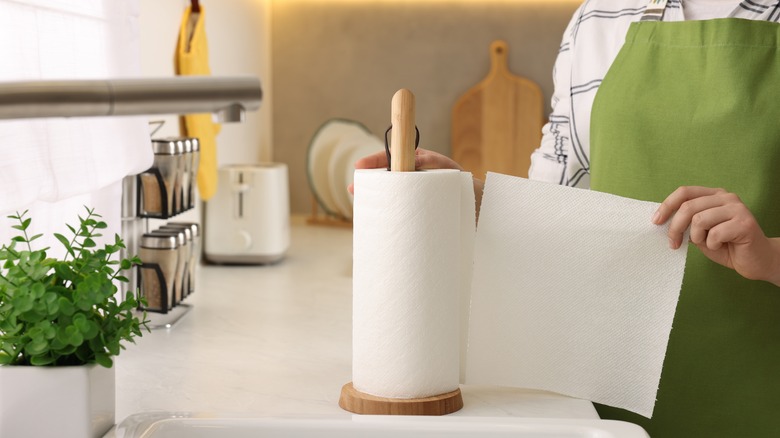Here's Why You Should Never Clean A Kitchen Counter With A Used Dish Towel
A clean and hygienic kitchen is essential for maintaining food safety and preventing the spread of harmful bacteria and contaminants. Among the various surfaces in the kitchen, countertops play a crucial role as they serve as preparation areas for food. When cleaning counters, using a used dish towel may seem like a convenient choice. However, this practice can have significant consequences for food safety. Dish towels are often used for drying dishes, wiping utensils, and handling various surfaces throughout the kitchen. As a result, they can accumulate food particles, grease, and bacteria over time. Wiping kitchen counters with a used dish towel can introduce these contaminants onto the surface instead of removing them.
The impact of cleaning counters with a dirty dish towel extends beyond mere cleanliness. It can pose cross-contamination risks, bacterial growth, and even allergen transfer. Understanding the limitations of using them and exploring alternative cleaning methods that prioritize food safety and hygiene is essential to maintaining a clean and safe kitchen.
Spreading bacteria in the kitchen
Using a used dish towel to clean kitchen countertops can lead to several potential health hazards. One of the primary concerns is cross-contamination. Raw food, such as meat, poultry, and seafood, can contain harmful bacteria like Salmonella, E. coli, and Campylobacter. When these foods come into contact with countertops, bacteria can transfer and multiply, posing a significant health risk. Additionally, fruits and vegetables may carry pesticide residues or microbial contaminants that can be transferred to countertops during food preparation.
Researchers from the University of Mauritius have shown that dish towels used for multiple purposes, like drying hands and dishes and wiping counters, have a higher bacterial growth rate, per Science Daily. Cleaning with them can spread the bacteria around, potentially contaminating other areas of the kitchen and heightening the risk of foodborne illnesses. Bacterial growth and multiplication are other concerns. Moisture present on a used dish towel provides an ideal environment for bacteria to thrive. If a towel is not dried adequately between uses, bacteria can multiply rapidly, further increasing the risk of contamination when it comes into contact with kitchen countertops.
Best practices for clean counters
Although it may not be as environmentally friendly, using disposable paper towels for cleaning kitchen countertops can prevent the spread of bacteria and reduce the risk of cross-contamination since they are discarded after use. Practicing proper food handling also minimizes the risk of contamination. For instance, washing your hands frequently and cleaning cutting boards, knives, and other utensils after each use can help prevent the spread of bacteria onto countertops.
Even if you don't use dish towels often, it's still important to visually inspect them for any visible stains, food residue, or odors and wash them regularly. Every three to five days is recommended, although certain situations may call for more frequent washing. For example, if you handle raw meat or other high-risk food items, it's advisable to wash the towels immediately after use to minimize the risk of bacterial transfer. The USDA recommends laundering them in the hot cycle of your washing machine.


